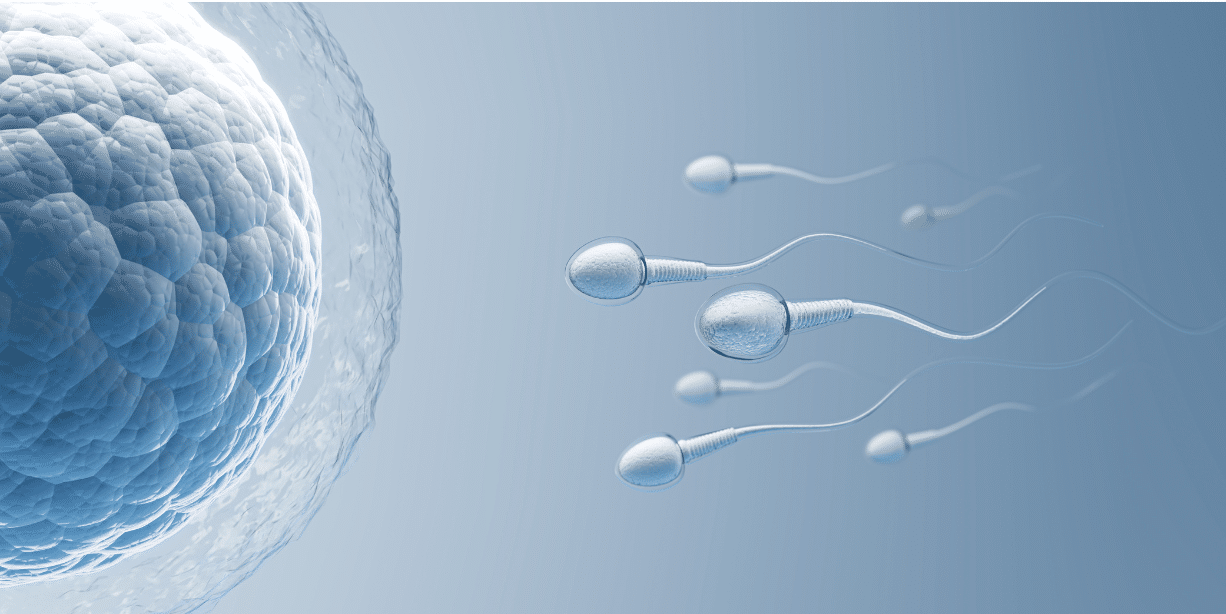
Optimal Male Fertility and Sperm Quality
Diet and Lifestyle Considerations for Fertility
This post is all about male fertility and sperm quality. When it comes to fertility, women tend to get most of the attention. The truth is, male fertility health is equivalently important when trying to conceive. Sperm health should be as much of a consideration as egg health when planning a pregnancy. Previously underestimated, male fertility and sperm quality is thought to be a factor in recurrent miscarriage. Additionally, sperm count, sperm motility, and sperm morphology are all important to getting pregnant. Research tells us that when any one of these are suboptimal, it takes longer to conceive, and could even prevent pregnancy from occuring.
We have worked with many couples who have struggled with infertility for months, or even years, before considering the role of both partners in fertility and a successful pregnancy. Our bodies are complex systems. There are many factors involved in pregnancy and infertility. We know that lifestyle factors including nutrition and diet, toxin exposure, stress management, exercise, and body weight affect male fertility and sperm quality.
Did you know that it takes from 65-75 days for spermatogenesis to occur? Spermatogenesis is the creation of new sperm, and men continue to create sperm thoughout their lives. From the very start of this process, until ejaculation, takes two to three months. We normally recommend that women start a prenatal vitamin at least three months before trying to conceive. Three months is how long it takes for the egg to mature before fertilization. Well, men are working with a similar timeline. That means that the lifestyle choices a man makes from two-three months until conception is a critical time for the health of the sperm he contributes to the pregnancy.
This post will provide education on optimal male fertility and sperm quality, potential causes of male infertility, oxidative stress and how it impacts fertility, and eating for male fertility. Spoiler alert…there is some good news. For both men and women, focusing on a nutritious and nourishing diet, helpful supplements, and healthy lifestyle factors promote fertility and will improve your chances of success. No matter your current circumstances, you have control over many daily choices that affect reproductive health.
Throughout, the terms male, man, and men are referring to people who were assigned male at birth (AMAB).

What is Infertility?
Infertility is when a couple has been trying to get pregnant using planned timing (when the woman is ovulating; this can be determined using ovulation strips or tracking her menstrual cycle), while having unprotected sex for at least one year without successful pregnancy. After the age of 35, a woman and her partner’s inability to conceive is deemed infertile after only six months. This may be due to male fertility and sperm quality issues.
In addition, recurrent miscarriages is defined as two or more pregnancy losses. As we have mentioned, research indicates that poor sperm health is a factor in recurrent pregnancy loss. In fact, before the end of the first trimester and after the pregnancy has been verified by a pregnancy test, 30-50% of conceptions end in spontaneous abortions, for no scientifically identifiable reason. Conception is typically lost during implantation. While 15-20% of clinical pregnancies, (the doctor has verified through ultrasound that there is a gestational sac, yolk sac, fetal pole and fetal heartbeat), end in spontaneous abortion.
According to the American Society for Reproductive Medicine, one in seven couples, or 14%, experience infertility. 35% of these cases are caused by female factors, roughly 35% by couple factors, and 20% from male factors. These means that male reproductive health may contribute to about 50% of infertility concerns.

Male Infertility Causes
There are many potential causes for male infertility and poor sperm quality. The main causes of male infertility stem from the inability to produce sperm, the inability to produce enough sperm, sperm morphology (sperm that is produced is abnormal and cannot survive to fertilizing the egg), sperm DNA integrity, and erectile dysfunction.
This can be caused by:
- Varicoceles – which is characterized as having swollen veins in the testicles. These can lead to decreased quality, sperm count and dysregulation of temperature. However, many fertile men also have varicoceles.
- Retrograde ejaculation – Sperm go into the bladder versus the penis during ejaculation.
- Undescended testicle – One or both testicles fail to descend from the abdomen into the scrotum before birth.
- Sperm morphology – abnormal shape and size of sperm affects fertilization.
- Poor sperm motility – resulting in unfertilized eggs.
- Hormone dysregulation – caused by a disorder in the pituitary glands, testes or thyroid glands.
- Blockage – caused by a vasectomy, a tumor or an injury that prevents sperm from mixing with semen before ejaculation.
- Genes – Klinefelter or Cystic Fibrosis are genetic conditions that causes male reproductive organs to form abnormally and lower sperm counts.
- Sperm DNA fragmentation – the presence of breaks or damage in the DNA of sperm cells which can affect fertility and the outcomes of assisted reproduction, like IVF.
- Oxidative damage – when sperm cells are damaged by reactive oxidative species and there are not enough antioxidants present to combat the damage. Thought to play a role in the majority of issues with sperm quality.
- Sexual dysfunction – like erectile dysfunction, prevents sperm from releasing.
- Psychological conditions, emotional, mental issues, and severe stress – can cause sexual dysfunction and decreased sperm potency.
- Other treatments – like aggressive cancer radiation or chemotherapy.
- Unexplained – the most common cause of male infertility, where we can’t specifically determine why sperm count is low, doesn’t move or appear the way it’s supposed to.
- Obesity and overweight – may alter hormones, decreasing sperm count and mobility.
- Age – Men who are 40 years or older may have difficulty getting their partners pregnant.
- Heavy drug use, smoking cigarettes or marjuana, excessive drinking, frequent exposure to radiation, pesticides, environmental toxins and certain medications – can also decrease male fertility. Recall that sperm is constantly produced, so unhealthy lifestyle habits and toxin exposure have an effect on sperm health.
It is important to discuss your concerns with your primary care doctor if you believe you are experiencing infertility to explore your options.

Supplements to Improve Male Fertility
An antioxidant supplement like Fairhaven Health (FH PRO) that contains L-carnitine, coenzyme Q10 (CoQ10), vitamin E, lycopene, N-acetyl L-cysteine, vitamins A, D3, C and K, B-complex vitamins, selenium, zinc, copper, chromium, molybdenum, grape seed extract, benfotiamine, and L-arginine resulted in a 33% increase in sperm count and 122% sperm motility increase. When sperm is attacked by free radicals seen in oxidative stress, the DNA falls apart and therefore becomes less fertile. If we can address oxidative stress through the supplementation of antioxidants and implementing naturally occurring antioxidants into the diet, it is likely we will see a better fertility outcome.
Glutathione is a naturally occurring detoxifier that combats excessive reactive oxygen species through preserving other antioxidants in the body. Reactive oxygen species are uncharged molecules in the body that take electrons from other molecules and can cause a chain reaction of damage known as oxidative stress (OS). Oxidative stress can be balanced out or neutralized with adequate antioxidants. However, if left in imbalance, OS can damage reproductive health and potentially could contribute to infertility. We know that a glutathione deficiency causes a man’s sperm to become defective. Talk to a registered dietitian about supplements if you think this could be beneficial to your fertility.

Foods to Improve Male Fertility and Sperm Quality
Nutrition is important for healthy fertility in men. Sperm count and motility are impacted by our dietary habits, or lack of nutrients from it. Positive effects on fertility are seen with diets rich in fruits, vegetables, walnuts, and fish, which provide ample antioxidants like vitamin C, beta carotene, vitamin E, vitamin A, folate and omega-three fatty acids, which provide eicosanoids that contribute to sperm structure.
A diet rich in plant foods like whole grains, legumes, fruits, and vegetables is also high in antioxidants such as lycopene, CoQ10, and vitamin C, and these have been positively associated with increased fertility.
Vitamin E & Vitamin C
Viamin E is well known as a powerful antioxidant. This supercharged vitamin can help prepare the uterine lining in women for an IVF transfer. In men, vitamin E can improve sperm quality and protect against oxidative damage. Foods high in vitamin E are wheat germ oil, peanuts or peanut butter, mango, avocado, red bell pepper, asparagus, pumpkin, beet greens, collard greens, spinach, some seed oils (sunflower, safflower, soybean) almonds, and sunflower seeds.
It is important to pair vitamin E and vitamin C foods together, as these vitamins work as a team to repair oxidative damage to our cells. Foods that are high in vitamin C are tomatoes, bell peppers, strawberries, broccoli, brussel sprouts, cauliflower, white potatoes, cabbage, oranges, kiwi, lemon and limes.
Vitamin A
Vitamin A supports male reproduction, as it is critical for male genital health and sperm production. High dose vitamin A supplements are not recommended, as they may actually have a negative effect on male fertility and sperm production. Foods that are high in vitamin A to include in the diet are orange, red, and yellow fruits and veggies like oranges, cantaloupe, carrots, sweet potatoes, pumpkin, red bell pepper, summer and winter squash; dark green leafies like kale, swiss chard, and spinach; broccoli, fish oils and beef liver, fortified breakfast cereals, juices, eggs, and full fat dairy products.
Folate
It is common knowledge that women trying to become pregnant should start a prenatal vitamin as early as she can in her journey to conceive. One of the main reasons for this is the increased folic acid (folate) in prenatal vitamins. This is because a low folate concentration in sperm damages the DNA, as folate is involved with making DNA and proteins in the cells.
Of course, we always recommend food as the primary source of nutrients. Thus, men should increase the amount of folate-rich foods in their diet. Foods that are high in this vitamin are dark green leafy vegetables like turnip greens and spinach, romaine, asparagus, brussel sprouts, broccoli, fresh fruits and fruit juices, liver, seafood, eggs, peanuts, sunflower seeds, and whole grains like amaranth, barley, brown rice, buckwheat, bulgur, millet, quinoa, rye, oats, sorghum, spelt, teff, wheat berries, and wild rice.
Foods to Limit
Negative effects on fertility are seen with diets right in processed meats, like hot dogs, salami, bacon, beef jerky, etc, full fat dairy products and excessive soy (men need not avoid soy altogether). These foods are seen to decrease sperm count and alter its motility.

What Else Affects Male Fertility and Sperm Quality?
There is increasing global interest in male fertility. With increased interest comes more research and finding. More studies are conducted every year because of the decline in sperm health throughout the world. Many of the issues are lifestyle related, and therefore, are modifiable. This is good news! Lifestyle is something everyone has the power to change. Other concerns besides diet and supplements in addressing male fertility and sperm quality include alcohol and drug use, medications, toxin exposure, physical activity and inactivity, body weight and composition, scrotal temperature, age, sleep, and stress.
Alcohol
It is common sense that women trying to become pregnant should avoid, or at least limit alcohol intake. The same goes for men. Research indicates that paternal use of alcohol can cause reproductive disturbances. Consequently, this may increase time to conceive, cause issues with embryo development, birth defects, or epigenetic changes to the DNA of the baby. We do not fully understand the longterm consequences of alcohol use by men who use alcohol, but if actively trying to conceive, it makes sense to limit or avoid alcohol. Note that alcohol abuse is defined as 15 or more drinks per week for men. This could be all within a weekend or greater than two drinks per day, on average.
Medications & Toxins
Medications and toxins can have a negative effect on male fertility. Specifically, toxins and medications can disrupt our endocrine sytem, and damage sertoli cells in the testes. Sertoli cells play a role in creating sperm by regulating the immune system in the testes and supporting and nourishing sperm cells. Maternal use of some medications can affect the fetus sertoli cells and gonadal development. It is important to discuss all medications with a physician if you are planning to create a tiny human, to make sure that you are not taking anything that may interfere with conception or having a healthy viable pregnancy.
In terms of toxins, there are many that we are exposed to daily via the environment, and as a by-product of normal human metabolism. Constantly bombarded by enviromental toxins, our innate antioxidant systems can get overloaded and struggle to repair cellular damage. There are tens of thousands of chemicals in our food, household items, and indoor and outdoor environments. We do not have much in terms of research on how all of this impacts fertility. The most evidence is on bisphenol-A and phlalates (for both egg and sperm quality). It is impossible to avoid all toxins. However, there are simple changes that anyone can make to start to mitigate personal toxin exposure. Avoiding reusable plastic food containers, canned foods, handling receipt paper, and highly processed food will eliminate some of the major sources of toxins known to decrease fertility. For more useful tips on cutting down exposure to toxins, check out our sister article, “Female Fertility Diet and Lifestyle.”
Physical Activity & Body Composition
Physical inactivity and a high amount of fat mass have been associated with infertility in men. Moreover, modest physical activity has been connected to improved sperm quality. And, if overweight, making small changes to get healthier and influence body composition. For example, adding more muscle so the ratio of fat to muscle is more balanced, can be helpful. On the other hand, you don’t need to be at an “ideal weight” to conceive a baby. But, this provides more incentive to stay active and eat well (as if we needed more reasons to do this, right?).
Scrotum Temperature
Keep “the boys” at a cool temperature. High scrotal temperature can reduce sperm production. Common advice for men is to avoid things like hot tubs and saunas, and to wear loose fitting underwear (avoid the tighty whities). We haven’t found much research to support the recommendation to change preferred undergarments. Also, make sure to get up and move at regular intervals. Sitting for too long at a stretch can cause overheating, and moving at least five minutes every hour has health benefits beyond fertility.
Sleep & Stress
Sleep is a major contributor to overall health, and it is often underappreciated. Poor sleep is implicated in heart disease, diabetes, hypertension, kidney disease, obesity, depression, poor memory, cognitive decline, and more. It is no surprise that sleep also affects fertility. In one study of almost 1000 men, those who slept less than six hours per night had lower sperm motility and higher anti-sperm antibody production than men who slept longer than six hours. In another similar study of couples, when men slept less than six hours per night or more than nine hours per night, there was a 40% decreased chance of conceiving. This is a powerful example of how our bodies are complex, integrated systems. Sleep is just one of the lifestyle pillars which affects our health in a multitude of ways.
There have been several studies investigating the effect of psychological stress on male fertility. These studies have provided some evidence that stress does in fact negatively affect sperm quality.
The Cliff Notes
Currently, there is evidence of a global decline in sperm health. This is likely due to poorer lifestyle habits, increased exposure to environmental toxins, and the advanced age of men when trying to conceive. While alarming, sperm production and quality is responsive to many lifestyle and dietary interventions. Making positive lifestyle choices can help to enhance the health of sperm, improving your chance of conceiving, and reducing the likelihood of miscarriage and birth defects.
Taking a holistic, integrative, and functional approach to health offers the best solutions to enhance male (and female) fertility. Eating well, adding in antioxidant supplements, avoiding alcohol, staying active, getting enough sleep, having healthy ways to manage stress, and taking steps to minimize vulnerability to environmental toxins are all great ways to promote healthy sperm production and improved male fertility. In spite of this information, it may pose a challenge determining where to start, what is most important, and how to implement this information in a simple and realistic way.
If you are looking for customized guidance and support for your fertility journey, we can help. Contact us here!
Medical Disclaimer:
The information provided on this blog is for educational and informational purposes only and is not intended as a substitute for medical advice, diagnosis, or treatment. Always consult with a qualified healthcare provider, such as your physician, pediatrician, or a registered dietitian, before making any changes to your or your child’s diet, health routine, or treatment plan.
While we are a medical practice specializing in integrative and functional nutrition, the content shared here reflects general knowledge and holistic guidance, and may not be appropriate for every individual. Reliance on any information provided on this site is solely at your own risk.

Resources:
1. Centers for Disease Control and Prevention. Infertility. Centers for Disease Control and Prevention. Published 2019. https://www.cdc.gov/reproductivehealth/infertility/index.htm
2. England CN. Female Fertility | Women & Infants Fertility Center. fertility.womenandinfants.org. https://fertility.womenandinfants.org/services/women
3. Gupta S, Agarwal A, Banerjee J, Alvarez JG. The Role of Oxidative Stress in Spontaneous Abortion and Recurrent Pregnancy Loss: A Systematic Review. Obstetrical & Gynecological Survey. 2007;62(5):335-347. DOI: https://doi.org/10.1097/01.ogx.0000261644.89300.df
4. Kaufman C. Foods That Can Affect Fertility. Eatright.org. Published 2018. https://www.eatright.org/health/pregnancy/fertility-and-reproduction/fertility-foods
5. England CN. Male Fertility | Women & Infants Fertility Center. fertility.womenandinfants.org. https://fertility.womenandinfants.org/services/male-infertility
6. Boost Your Fertility with Supplements. American Pregnancy Association. Published August 23, 2019. https://americanpregnancy.org/getting-pregnant/infertility/boost-your-fertility/
7. Adeoye O, Olawumi J, Opeyemi A, Christiania O. Review on the role of glutathione on oxidative stress and infertility. JBRA Assisted Reproduction. Published online 2017. DOI: https://doi.org/10.5935/1518-0557.20180003
8. McDonald E. Don’t make the mistake of letting a diet kill sperm. www.uchicagomedicine.org. Published December 10, 2018. https://www.uchicagomedicine.org/forefront/health-and-wellness-articles/dont-make-the-mistake-of-letting-a-diet-kill-sperm
9. Harvard School of Public Health. Vitamin E. The Nutrition Source. Published September 18, 2012. https://www.hsph.harvard.edu/nutritionsource/vitamin-e/
10. Harvard School of Public Health. Vitamin C. The Nutrition Source. Published March 2020. https://www.hsph.harvard.edu/nutritionsource/vitamin-c/
11. Harvard School of Public Health. Vitamin A. The Nutrition Source. Published July 2, 2019. https://www.hsph.harvard.edu/nutritionsource/vitamin-a/
12. Harvard School of Public Health. Folate (Folic Acid) – Vitamin B9. The Nutrition Source. Published September 18, 2012. https://www.hsph.harvard.edu/nutritionsource/folic-acid/
13. Romero Herrera JA, Bang AK, Priskorn L, Izarzugaza JMG, Brunak S, Jørgensen N. Semen quality and waiting time to pregnancy explored using association mining. Andrology. 2021 Mar;9(2):577-587. doi: 10.1111/andr.12924. Epub 2020 Nov 14. PMID: 33084252.
14. Gkeka K, Symeonidis EN, Tsampoukas G, Moussa M, Issa H, Kontogianni E, Almusafer M, Katsouri A, Mykoniatis I, Dimitriadis F, Papatsoris A, Buchholz N. Recurrent miscarriage and male factor infertility: diagnostic and therapeutic implications. A narrative review. Cent European J Urol. 2023;76(4):336-346. doi: 10.5173/ceju.2023.74. Epub 2023 Nov 13. PMID: 38230311; PMCID: PMC10789276.
15. Clagett-Dame M, Knutson D. Vitamin A in reproduction and development. Nutrients. 2011 Apr;3(4):385-428. doi: 10.3390/nu3040385. Epub 2011 Mar 29. PMID: 22254103; PMCID: PMC3257687.
16. Esteves SC, Zini A, Coward RM, Evenson DP, Gosálvez J, Lewis SEM, Sharma R, Humaidan P. Sperm DNA fragmentation testing: Summary evidence and clinical practice recommendations. Andrologia. 2021 Mar;53(2):e13874. doi: 10.1111/and.13874. Epub 2020 Oct 27. PMID: 33108829; PMCID: PMC7988559.
17. Cambiasso MY, Gotfryd L, Stinson MG, Birolo S, Salamone G, Romanato M, Calvo JC, Fontana VA. Paternal alcohol consumption has intergenerational consequences in male offspring. J Assist Reprod Genet. 2022 Feb;39(2):441-459. doi: 10.1007/s10815-021-02373-0. Epub 2022 Mar 21. PMID: 35307778; PMCID: PMC8956782.
18. Sapra KJ, Eisenberg ML, Kim S, Chen Z, Buck Louis GM. Choice of underwear and male fecundity in a preconception cohort of couples. Andrology. 2016 May;4(3):500-8. doi: 10.1111/andr.12163. Epub 2016 Mar 3. PMID: 26939021; PMCID: PMC6214186.
19. McKinnon CJ, Joglekar DJ, Hatch EE, Rothman KJ, Wesselink AK, Willis MD, Wang TR, Mikkelsen EM, Eisenberg ML, Wise LA. Male personal heat exposures and fecundability: A preconception cohort study. Andrology. 2022 Nov;10(8):1511-1521. doi: 10.1111/andr.13242. Epub 2022 Aug 11. PMID: 35924639; PMCID: PMC9588744.
20. Foucaut AM, Faure C, Julia C, Czernichow S, Levy R, Dupont C; ALIFERT collaborative group. Sedentary behavior, physical inactivity and body composition in relation to idiopathic infertility among men and women. PLoS One. 2019 Apr 24;14(4):e0210770. doi: 10.1371/journal.pone.0210770. PMID: 31017887; PMCID: PMC6481765.
21. Corpuz-Hilsabeck M, Culty M. Impact of endocrine disrupting chemicals and pharmaceuticals on Sertoli cell development and functions. Front Endocrinol (Lausanne). 2023 Jan 30;14:1095894. doi: 10.3389/fendo.2023.1095894. PMID: 36793282; PMCID: PMC9922725.
22. De Jonge CJ, Barratt CLR, Aitken RJ, Anderson RA, Baker P, Chan DYL, Connolly MP, Eisenberg ML, Garrido N, Jørgensen N, Kimmins S, Krausz C, McLachlan RI, Niederberger C, O’Bryan MK, Pacey A, Priskorn L, Rautakallio-Hokkanen S, Serour G, Veltman JA, Vogel DL, Vazquez-Levin MH. Current global status of male reproductive health. Hum Reprod Open. 2024 Apr 12;2024(2):hoae017. doi: 10.1093/hropen/hoae017. PMID: 38699533; PMCID: PMC11065475.
23. Liu MM, Liu L, Chen L, Yin XJ, Liu H, Zhang YH, Li PL, Wang S, Li XX, Yu CH. Sleep Deprivation and Late Bedtime Impair Sperm Health Through Increasing Antisperm Antibody Production: A Prospective Study of 981 Healthy Men. Med Sci Monit. 2017 Apr 16;23:1842-1848. doi: 10.12659/msm.900101. PMID: 28412762; PMCID: PMC5402839.
24. Wise LA, Rothman KJ, Wesselink AK, Mikkelsen EM, Sorensen HT, McKinnon CJ, Hatch EE. Male sleep duration and fecundability in a North American preconception cohort study. Fertil Steril. 2018 Mar;109(3):453-459. doi: 10.1016/j.fertnstert.2017.11.037. PMID: 29566862; PMCID: PMC5868973.
25. https://www.bu.edu/sph/news/articles/2016/too-much-too-little-sleep-hurts-mens-ability-to-get-partners-pregnant/


